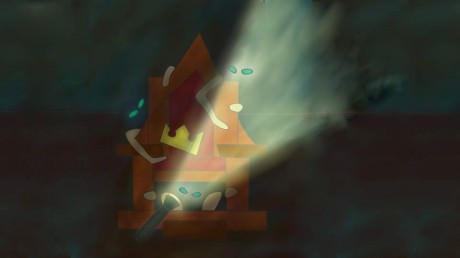When it comes to Fringe, Shakespeare is an ace in the hole. Audiences find it familiar, but they also expect more in the bargain. Rude Mechanicals’ production of Macbeth: Instruments of Darkness is a great example of this. The show has some really big ideas for Shakespeare’s Scottish Play, but in the end it’s a bet they can’t quite cover.
Director Joshua Engel has two big ideas for the show, both stemming from Shakespeare’s line “The instruments of darkness tell us truths, win us with honest trifles, to betray us in deepest consequence.” The first has to do with the literal line between darkness and light. The stage lighting (by Irene Sitoski) is dominated by an unmoving, central spotlight. Characters step in and out of the circle, literally finding their light for some of the big scenes and soliloquies. But the production is muddy about the difference between dark and light, making it difficult to tell when someone’s intentionally standing on the edge of the light or just missing their mark. This attachment to darkness finds its most literal manifestation in Lady Macbeth (Jaki Demarest), who is blind in this production. Where other characters navigate by flashlight, Lady M is preternaturally sure of herself. It’s a shame that there’s no variation in her ability to navigate, as Demarest is by far the most talented of the more mature actors in the show. Her only challenge for the title comes from Sam David in an unfortunately small role as Lady Macduff.
Engel’s second big idea is the omnipresence of the Wyrd sisters (Rebecca Speas, Diane Samuelson, Lauren Beward). The witches make their usual appearances, and their first entrance is one of the big coups of the production. But the three play other parts as well: the soldiers who report Macbeth’s valiance to Duncan; the maids who prepare Lady Macbeth; the murderers who kill Banquo and (quite intentionally) let Fleance live; and the soldiers who suggest the whole “hide behind tree branches” thing. Of the two concepts, it’s by far the more successful. The three young women do a fantastic job gliding through their various roles, never letting the witches sink far below the surface.
In fact, it’s the younger members of the cast who keep the production afloat. Evan Ockershausen is a fine Malcolm, and it’s a shame that so much of his arc is hampered by sloppy cuts. The scene between Malcolm and Macduff (Michael C. Robinson) in England is a stumbling block in most productions of Macbeth, but these actors could have made it a lynchpin of the show. Robinson’s Macduff is energetic and passionate, and from the moment he reports on Duncan’s murder it’s clear that he’s an actor to watch. Holly Trout does solid work in a supporting role as Ross; Melissa Schick gives a bawdy, valiant attempt as the Porter in a play that doesn’t build enough tension to need the comic relief.
Macbeth, like many of Shakespeare’s plays, lends itself to both subtle tweaks and big concepts. But the bigger the idea, the defter touch you need to make it work with the original. Instruments clearly has some great ideas behind it, but that’s only half the battle.
Running Time: 75 minutes.
Macbeth: The Instruments of Darkness plays through July 26, 2014 at the Warehouse – 645 New York Ave NW, in Washington, DC. For performance information and to purchase tickets, go to their Capital Fringe Page.





